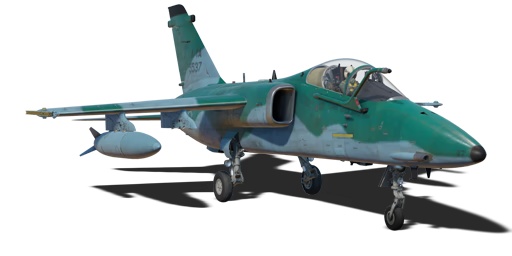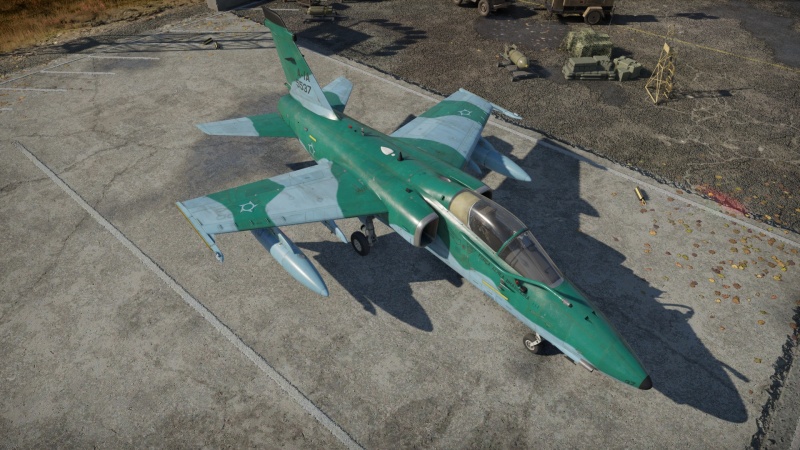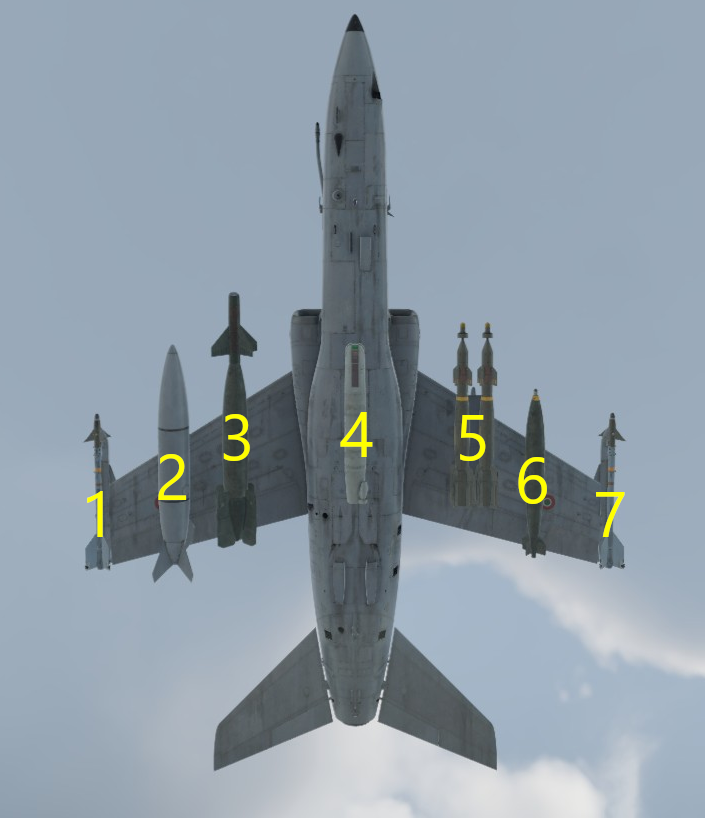Difference between revisions of "AMX A-1A"
(Tag: Visual edit) |
Isaac_Victor (talk | contribs) (→Pros and cons: add Cons about belt and balistic computer) (Tag: Visual edit) |
||
| Line 238: | Line 238: | ||
* Subsonic, can only reach Mach 1 in dive | * Subsonic, can only reach Mach 1 in dive | ||
* Can rip the wings when having too much G-overload during a turn | * Can rip the wings when having too much G-overload during a turn | ||
| + | * HEF and HEI ammunition has a different velocity than API-T, which causes the ballistic computer to flash when shooting with most available ammunition belts. | ||
== History == | == History == | ||
Revision as of 16:53, 8 September 2024
| This page is about the Brazilian jet fighter-bomber AMX A-1A. For other versions, see AMX (Family). |
Contents
Description
The Brazilian Air Force (FAB) needed a replacement for the obsolete AT-26 Xavante light attack and training aircraft. In 1981, after extensive negotiations between the countries, the Brazilian company Embraer was invited to take part in the Italian project of the AMX, resulting in the AMX-International consortium. The project was split into three companies: 46.7% for Aeritalia (including the central fuselage), 23.6% for Aermacchi (which included the front fuselage), and 29.7% for Embraer (including the wings, landing gear, and disposable fuel tanks). The first prototype of the AMX first flew on 15 May 1984. The Brazilians decided to use two 30 mm DEFA cannons as primary armament instead of a 20 mm minigun. The AMX entered service with the FAB in 1989 and was upgraded to the A-1M standard in 2013, almost the same version as the Italian AMX A-11A ACOL.
Introduced in Update "Seek & Destroy", the AMX A-1A Ghibli is pre-upgrade to the A-1M standard. Compared to the Italian A-11A, the AMX A-1A has different armaments as primary weapons with two powerful 30 mm DEFA cannons, air-to-air missiles such as the MAA-1 Piranha, and other kinds of rockets and bombs. The AMX A-1A is a perfect vehicle for CAS in ground RB with its guided bombs, capable of making easy work of enemy tanks.
General info
Flight performance
Describe how the aircraft behaves in the air. Speed, manoeuvrability, acceleration and allowable loads - these are the most important characteristics of the vehicle.
| Characteristics | Max speed (km/h at _,___ m) |
Max altitude (metres) |
Turn time (seconds) |
Rate of climb (metres/second) |
Take-off run (metres) | |||
|---|---|---|---|---|---|---|---|---|
| AB | RB | AB | RB | AB | RB | |||
| Stock | ___ | ___ | 12500 | __._ | __._ | __._ | __._ | ___ |
| Upgraded | ___ | ___ | __._ | __._ | __._ | __._ | ||
Details
| Features | |||||
|---|---|---|---|---|---|
| Combat flaps | Take-off flaps | Landing flaps | Air brakes | Arrestor gear | Drogue chute |
| ✓ | ✓ | ✓ | ✓ | ✓ | X |
| Limits | ||||||
|---|---|---|---|---|---|---|
| Wings (km/h) | Gear (km/h) | Flaps (km/h) | Max Static G | |||
| Combat | Take-off | Landing | + | - | ||
| 1,180 | 444 | 850 | 793 | 500 | ~__ | ~__ |
| Optimal velocities (km/h) | |||
|---|---|---|---|
| Ailerons | Rudder | Elevators | Radiator |
| < 650 | < 650 | < 650 | - |
Engine performance
| Engine | Aircraft mass | ||||||
|---|---|---|---|---|---|---|---|
| Engine name | Number | Basic mass | Wing loading (full fuel) | ||||
| Rolls-Royce Spey 807 | 1 | 6,807 kg | 417 kg/m2 | ||||
| Engine characteristics | Mass with fuel (no weapons load) | Max Gross Weight | |||||
| Weight (each) | Type | 10m fuel | 20m fuel | 30m fuel | 34m fuel | ||
| 1,856 kg | Low-bypass turbofan | 7,644 kg | 8,447 kg | 9,269 kg | 9,597 kg | 13,477 kg | |
| Maximum engine thrust @ 0 m (RB/SB) | Thrust to weight ratio @ 0 m (100%) | ||||||
| Condition | 100% | WEP | 10m fuel | 20m fuel | 30m fuel | 34m fuel | MGW |
| Stationary | 4,719 kgf | - | 0.62 | 0.56 | 0.51 | 0.49 | 0.35 |
| Optimal | 5,120 kgf (1,000 - 1,180 km/h) |
- | 0.67 | 0.61 | 0.55 | 0.53 | 0.38 |
Survivability and armour
Examine the survivability of the aircraft. Note how vulnerable the structure is and how secure the pilot is, whether the fuel tanks are armoured, etc. Describe the armour, if there is any, and also mention the vulnerability of other critical aircraft systems.
Modifications and economy
Armaments
| Ballistic Computer | ||||
|---|---|---|---|---|
| CCIP (Guns) | CCIP (Rockets) | CCIP (Bombs) | CCRP (Bombs) | EEGS |
| |
|
|
|
|
Offensive armament
The AMX A-1A is armed with:
- 2 x 30 mm DEFA 554 cannons, nose-mounted (150 rpg = 300 total)
- 120 x countermeasures
Suspended armament
The AMX A-1A can be outfitted with the following ordnance:
| 1 | 2 | 3 | 4 | 5 | 6 | 7 | ||
|---|---|---|---|---|---|---|---|---|
| 230 kg BAFG-230 bombs | 1 | 1, 2 | 1, 2 | 1, 2 | 1 | |||
| 230 kg BFA-230/2 bombs | 1 | 1, 2 | 1, 2 | 1, 2 | 1 | |||
| 460 kg BAFG-460 bombs | 1 | 1 | 1, 2 | 1 | 1 | |||
| 460 kg BFA-460/2 bombs | 1 | 1 | 1, 2 | 1 | 1 | |||
| 500 lb LDGP Mk 82 bombs | 1 | 1, 2 | 1, 2 | 1, 2 | 1 | |||
| 500 lb Mk 82 Snakeye bombs | 1 | 1, 2 | 1, 2 | 1, 2 | 1 | |||
| 920 kg BAFG-920 bombs | 1 | 1 | 1 | |||||
| 1,000 lb LDGP Mk 83 bombs | 1 | 1 | 1, 2 | 1 | 1 | |||
| BA-FG-230-Lizard-2 bombs | 1* | 1, 2 * | 1, 2 * | 1* | ||||
| BINC-300 incendiary bombs | 1 | 1, 2 | 1, 2 | 1, 2 | 1 | |||
| Skyfire-70 AC/AP rockets | 7, 19 | 7, 14, 19, 38 | 7, 14, 19, 38 | 7, 19 | ||||
| MAA-1 Piranha missiles | 1 | 1 | ||||||
| LITENING II targeting pod | 1* | |||||||
| 580 l drop tanks | 1 | 1 | ||||||
| Maximum permissible weight imbalance: 1,500 kg | ||||||||
| * LITENING pod must be equipped when equipping guided bombs | ||||||||
| Default weapon presets | |
|---|---|
| |
Usage in battles
Describe the tactics of playing in the aircraft, the features of using aircraft in a team and advice on tactics. Refrain from creating a "guide" - do not impose a single point of view, but instead, give the reader food for thought. Examine the most dangerous enemies and give recommendations on fighting them. If necessary, note the specifics of the game in different modes (AB, RB, SB).
Pros and cons
Pros:
- Powerful anti-air missile MAA-1
- Excellent acceleration and flight performance
- Guided bombs
- Powerful 30mm DEFAs
- LITENING can lock onto planes, providing advanced gun aim assist against aircraft (generally a feature only expected of a 11.0+ plane with a radar)
Cons:
- No Afterburner
- Subsonic, can only reach Mach 1 in dive
- Can rip the wings when having too much G-overload during a turn
- HEF and HEI ammunition has a different velocity than API-T, which causes the ballistic computer to flash when shooting with most available ammunition belts.
History
Describe the history of the creation and combat usage of the aircraft in more detail than in the introduction. If the historical reference turns out to be too long, take it to a separate article, taking a link to the article about the vehicle and adding a block "/History" (example: https://wiki.warthunder.com/(Vehicle-name)/History) and add a link to it here using the main template. Be sure to reference text and sources by using <ref></ref>, as well as adding them at the end of the article with <references />. This section may also include the vehicle's dev blog entry (if applicable) and the in-game encyclopedia description (under === In-game description ===, also if applicable).
Devblog
During the late 1970s, the Italian Air Force specified a set of requirements for a new aircraft to replace the outdated G.91 and F-104 in their respective roles of ground attack and aerial reconnaissance. Aeritalia and Aermacchi entered a joint venture to develop the new aircraft, with work on the project commencing in 1978. By 1980, Brazil was also looking into modernizing their strike aircraft fleet and thus expressed interest in joining the development of the new aircraft. After agreeing on the requirements in 1981, Embraer joined the consortium, subsequently named AMX International.
Focusing on designing a light and cost-efficient strike aircraft, development of the new aircraft progressed quickly. The first prototype of the aircraft flew in 1984 and following a successful test period, the AMX entered production in 1988. Due to the shared development effort, the Italian and Brazilian variants of the aircraft only differ in minor aspects. After entering service, Italian AMX aircraft participated in operations during the Balkan Wars of the 1990s and Libya in 2011 where the type distinguished itself in combat. The AMX is still in active service Brazilian air forces to this day, while in Italy they were just retired in 2024.
Media
Excellent additions to the article would be video guides, screenshots from the game, and photos.
See also
- Related development
- Aircraft of comparable role, configuration and era
External links
| AMX International Ltd. | |
|---|---|
| Jet Aircraft | AMX · AMX A-1A |
| Note | AMX International is an joint-venture to develop, manufacture and market the AMX aircraft and is unrelated to the Tank Manufacturer AMX |
| Italy jet aircraft | |
|---|---|
| Aerfer | Sagittario 2 · Ariete |
| Fiat | G.91 pre-serie · G.91 R/1 · G.91 R/4 (Portugal) · G.91 Y · G.91 YS |
| AMX International | AMX · AMX A-1A (Brazil) |
| Panavia | Tornado ADV · ▄Tornado IDS · ▄Tornado IDS (1995) |
| Foreign: | |
| Vampire | Vampire FB 52A |
| F-84 | ▄F-84F · ▄F-84G-21-RE |
| F-86 | CL-13 Mk.4 · ▄F-86K |
| F-104 | ▄F-104G · F-104S · ▄F-104S TAF (Turkey) · F-104S.ASA |
| F-16 | ▄F-16A ADF |
| AV-8 | ▄AV-8B Plus |
| Hungary | |
| Mikoyan-Gurevich | ◔MiG-15bis · ◔MiG-17PF · ◔MiG-21MF · ◔MiG-21bis-SAU · ◔MiG-23MF · ◔MiG-29 |
| Ilyushin | ◔IL-28 |
| Sukhoi | ◔Su-22M3 |
| Saab | ◔JAS39EBS HU C |
| Italy premium aircraft | |
|---|---|
| Fighters | CR.32 bis · Marcolin's C.R.42 CN · He 112 B-1/U2 · Re.2001 gruppo 22 |
| C. 202D · IAR-81C · ▄Spitfire Mk Vb/trop · ◐Bf 109 F-4 · ◐Bf 109 G-2 · G.55S | |
| Jet fighters | Ariete · G.91 R/4 · ▄F-104S TAF |
| Strike aircraft | ◐Bf 110 G-4 · Hs 129 B-2 (Romania) · Ro.57 Quadriarma |
| AMX A-1A | |






